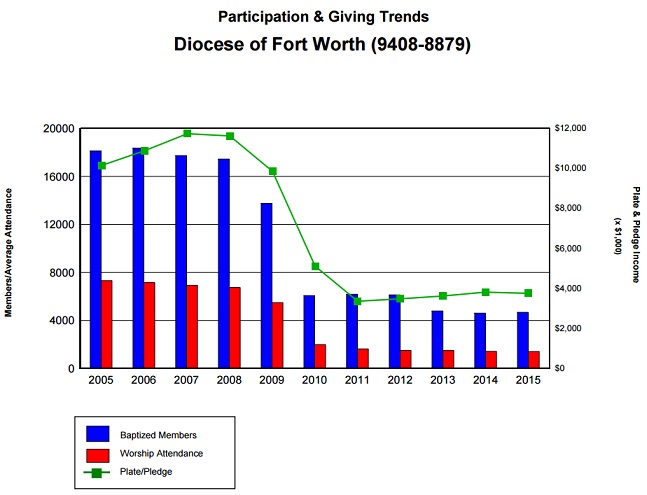IRD’s Jeff Walton questions the claims of growth for the Fort Worth Episcopalians loyal to the national church
Episcopal News Service (ENS) — the Episcopal Church’s official mouthpiece — is this week running a continuing series of articles on the renewing Episcopal Diocese of Fort Worth (TEC), the remaining Episcopal diocese which effectively formed late in 2008 after a supermajority of Fort Worth Episcopalians all voted to disassociate from the denomination.
The central focus of the first article is that remaining Episcopal Church members are reconceiving what church entails, and are now focused upon social service and outreach as they worship in unconventional spaces.
“We‘re not trying to rebuild an old church,” Fort Worth Bishop Provisional J. Scott Mayer (pictured) tells ENS. “We are trying to participate in resurrection to become a new body.”
Episcopalians have the right to reorganize themselves into a new entity and continue their affiliation with the national church. But the article makes statements up front that are not in accord with the church’s own self-reported statistics:
Fort Worth has 17 congregations, including a Lutheran congregation pastored by an Episcopal priest. In the time since the split, the diocese has seen a 19.3 percent increase in communicant members and an 11.9 percent increase in operating revenue. Since reorganizing in 2009, Fort Worth has annually paid the full amount asked of it by the Episcopal Church to support the churchwide triennial budget. It is the only one of six dioceses in the state of Texas to do so.
Statistics provided by the Episcopal Church Office for Research tell a different story. In 2010 the remaining diocese reported 22 parishes, 6,075 members and average Sunday attendance of 1,995. By 2015 that had dropped to 15 parishes (-32%), 4,674 members (-23%) and 1,416 attendees (-29%). Marriages performed declined from 21 to 12 (-43%). This is not a trajectory of growth.
At the denomination’s 2015 General Convention in Salt Lake City, Utah, the Fort Worth Diocese (TEC) tweeted “No downward trajectory. Moving on up.” The denomination that year later reported Fort Worth diocesan membership -3.6% and attendance -3.8%, contrary to claims made at General Convention that the remaining Episcopalians stabilized and were growing.
respectfully, @jeffreyhwalton, fact check on @DioFW trajectory is here, from @RevJanetW. No downward trajectory. Moving on up.
There is no question that remaining Episcopalians have faithfully supported the national church, which recognized and responded to that support through their own contributions to local ministry:
The wider Episcopal Church has supported the diocese’s reinvention. The Executive Council, which has met in the diocese twice since the split, in June offered a combination of a direct grant from the churchwide budget, money raised by the Church’s development office and the presiding bishop, and grants for church planting and mission enterprise zone development through the Resolution 2015-D005 church planting process.
However, the TEC-affiliated diocese needs a significant ongoing contribution from the national church. According to an August 2016 budget projection, 2017 expenses are projected to be $787,000. The local Episcopal Church group is asking for about 38% of its needed funding from the national church (a figure several times the annual asking back to the national church).
It is reasonable to ask if this story from ENS, the two executive council meetings held within the diocese, and the much-touted fact that Fort Worth pays its allotment to the national church is all aimed at showing a Texas judge that it is more than a placeholder intended to claim property in the ongoing legal battle against the Diocese of Fort Worth that disaffiliated from TEC in 2008 and subsequently joined the Anglican Church in North America (ACNA). The Episcopal Church does not recognize the right of dioceses to leave the denomination and is fighting an ongoing legal battle against the diocesan corporation. Yes, the Episcopal Church is still engaged in litigation against former members:
Transforming the way the Episcopal Church ministers in the 24 counties of north central Texas comes out of necessity, in part, as the Episcopal Church and the diocese seek to recover property and other assets still controlled those who left. The Texas Court of Appeals is considering the case after hearing oral arguments in the case on April 19, 2016.
In 2010 the local appellate court recognized that only the Diocese of Fort Worth (ACNA) could hold itself out as the original diocese for purposes of the lawsuit. Litigation over the use of intellectual property associated with the diocese is also pending.
Dioceses that the Episcopal Church categorizes as “renewing” (rebuilding after departures) continue to be relatively small and receive a disproportionate share of their income in the form of grants from the national church. Following the conclusion of property litigation in Illinois (a court ruling determined that departing Anglicans rightfully held diocesan property), remaining Episcopalians from the Diocese of Quincy chose to juncture with the much larger Diocese of Chicago, a path that other renewing dioceses may themselves follow.
First printed at Juicy Ecumenism



